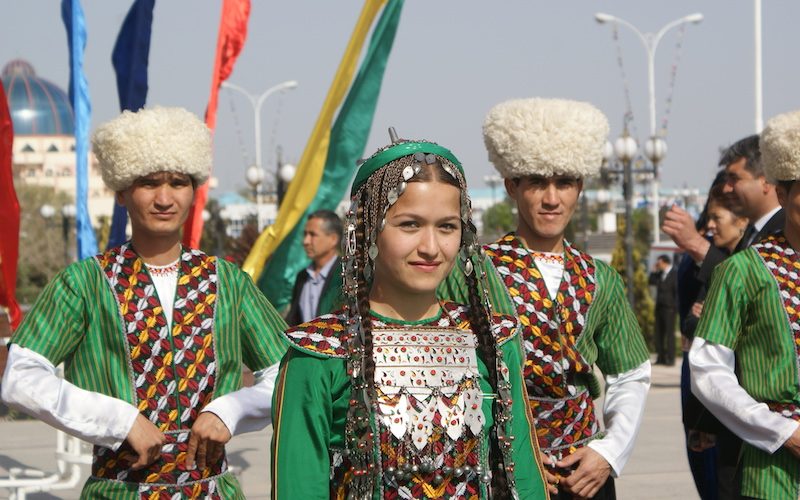
Turkmen in traditional costumes. Photo (c): Abel Polese, 2014-15, used with permission.
Ashgabat, 4.30 am. A crowd of foreign guests has gathered in the arrivals hall of the capital's international airport, sleepy but excited. They are met by a young man in his early 30s, who runs back and forth between from the group in the arrivals hall and the street, ensuring that everyone gets onto the right car headed for the right hotel.
This is a common scene at airports, but on looking at the scene more closely, the casual observer will notice one major difference: The young man politely addresses guests from Arabic-speaking countries in their language, gives others instructions in Russian, welcomes Turkish scholars in Turkish, offers European and American guests help in English, and delivers instructions to taxi drivers in the Turkmen language. Then a colleague arrives and starts addressing Farsi-speaking guests in their native language, in addition to other languages in his personal language reservoir.
Taking care of guests is never an easy task, especially when the guests number several dozen. But our Turkmen friends know exactly whom to address in what language, and when they meet someone new, they immediately memorise what tongue that person requires.
Later in the day, the interested guest is likely to be surprised yet again, on discovering that the scene at the airport was not an isolated case: Multilingualism is a common feature among Turkmenistan’s educated class. In a fashion that seems to hearken back to another century, when diplomacy was carried out by multilingual individuals who were sent to study at the best universities in the region, a large number of Turkmen speak several languages, and not necessarily the one that would seem to be the easiest.
This scene might be even more unexpected in a relatively closed country such as Turkmenistan, which all foreign citizens require a visa to visit. What can this new multilingualism tell us about how Turkmenistan's elite see the country's place in the world? And what might they tell the world with their new linguistic skills?
The roots of Turkmen multilingualism
When asked, Turkmen make no secret of how and why they have had to learn other languages. It allegedly all started in the 1990s when, in times of uncertainty, some educated Turkmen started looking beyond Moscow and countries in the former Soviet space to pursue their university education.
Some went to Cairo: Universities in Egypt would enrol anyone who applied and tuition fees were low and sometimes non-existent. The only obstacle was completing the application form in Arabic. But our resourceful Turkmen would find someone to help them and, after arriving there, would start picking up the language.
(This, in fact, is the principle behind all intra-university exchange programmes. The difference is that in the Turkmen case, the learning experience arose out of individual initiative rather than a structured mechanism.)
Not all Turkmen found Egypt convenient or suitable. Another major educational hub was Teheran, where some future graduates would go to study and return fluent in Farsi.
Turkey was, and still is, another major destination. Turkmen citizens need no visa to enter the country and the two languages are close, and mutually intelligible to a fair extent. As a result, the two countries have close ties—closer than Turkmenistan has with some its former Soviet neighbours. For comparison, note that while several direct flights per day between Istanbul and the Turkmen capital Ashgabat are available daily, not a single direct flight between Ashgabat and the much closer Tajik capital, Dushanbe.
The Turkish language also enjoys a special status in Turkmenistan, where knowledge of the “Ottoman language” is considered normal among the educated classes. Turkish television channels broadcast in Turkmenistan. Both Turkish government and private sector Turkish actors are active in the country through the TIKA Turkish Development State Agency (TIKA) and construction companies. Asghabat's first large shopping mall was built by a Turkish company, and has an entire floor dedicated to the sale of Turkish produce, as well as Turkish-speaking personnel to serve Ashgabat’s Turkish expat community.
I have never asked Turkmen how they know Russian. It seems too naïve a question to pose in a former Soviet country even if Russian language has long been phased out in many spheres of life. Yet, the country’s main newspaper, Neytralny Turkmenistan, still publishes a Russian edition. In addition—and this is a general rule—a country with limited resources needs to import a number of things, including education. A number of Turkmen also continue to be educated at institutions where Russian is the language of instruction, whether in Russia, Ukraine or other former Soviet capitals. There is, for instance, no school for aircraft pilots in Turkmenistan, but the country still needs pilots, who are usually trained in Ukraine.
As in the case of Turkish, Russian is also often acquired through leisure activities. The number of pirated movies produced in Russia might be enough to justify learning Russian. Satellite TV is also available in Turkmenistan and the most accessible language, along with Turkish, is still Russian.
While Russian is no longer an official language and is not used for official signs or communication, and while the Cyrillic alphabet has been replaced by the Latin one (with special letters to accommodate Turkmen sounds), the full transition to Turkmen has not yet taken place. Simple signs like “wet paint”, or “do not walk this way” in a park or near a construction site are usually written in Turkmen, but it is not uncommon for them to be accompanied by an unofficial Russian translation. The most logical explanation for this is the fact that some Turkmen failed to notice the sign because of the new alphabet. Those who have difficulties reading Latinised Turkmen can at least understand the Russian version.
But opportunities and challenges have nevertheless pushed Turkmen elites to resort to other channels and establish close relations with other non-Soviet countries that have few political ties with Turkmenistan.
While highly centralised from an official standpoint, Turkmen politics are strongly influenced by informal and personal relations. If the official presidential translator, for instance, has spent a number of years in Iran, Turkey or Egypt, that person can translate cultural concepts and propose a nuanced understanding of foreign diplomats’ attitudes. They can also remind the president, if he is not yet aware of it, of the role that country plays in the lives of Turkmenistan and its elites. This could shed some positive light on the relationship, and, possibly, lead to better economic or political relations. Turkmen elites, especially those trained abroad, therefore have agency (albeit limited) and can exercise an influence on the country's decision-making.
We cannot know exactly to what extent, but critical analyses of international relations from Wendt’s Social Theory of International Politics onward have widely acknowledged the influence of personal relationships, perceptions and other individual and subjective elements in political decisions. Through having relations with countries other than Russia (and the West) Turkmens draw inspiration about models of consumption, technologies, political ideas and business from a variety of sources, then import and re-elaborate them and make them part of the national ideology. Since independence, Turkmenistan has discovered, rediscovered, or invented a number of myths and traditions that have been inspired by other countries.
There are definitely a number of myths, stories and traditions that have survived the Soviet period. But the complexity of post-modern rituals, national turbo-pop songs and traditions have also been partly imported.
What is clear is that Russia is not necessarily Turkmenistan’s primary inspiration. A number of other countries, whose importance has perhaps been underestimated, have also contributed not only to the formation of Turkmen elites, but possibly also—indirectly—to shaping the country's official narrative, political attitudes, and where the country locates itself in the international political arena.








1 comment
It’s an interesting blog but the author does not mention one other possible, important reason for Turkmens being multilingual is the absence of modern printed, online literature, information in the Turkmen language. Turkmens must speak many languages in order to stay literate and read news sources and literature in other languages.